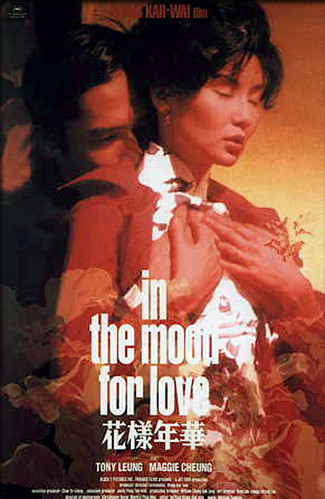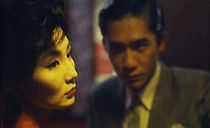A little while back, dazzled by Wong Kar-Wai's "2046," I suggested it might be "the first great film of the millennium." Now I've caught up with one of Wong's earlier films, "In the Mood for Love," made about four years earlier than "2046."
The camerawork for "In the Mood for Love" again uses a rich color palette in an odd, but striking, counterpoint to the rather sad and minor-key story. (The English title, which suggests a frivolous comedy, runs counter to the film's style — a poor translation, maybe?) There's nothing here like "2046's" science fiction inserts and time slips; although a period piece, taking place in Hong Kong in 1962 (quite interesting to see how things looked there and then), it moves forward with a stately gravity in conventional time sequence.
The screen belongs to its two stars, Maggie Cheung and Tony Leung. They are just about all that matters in "Mood," and they're more than able to carry it by a nuanced portrayal of reticent passion. (Here's a plot summary, if you're interested, though there's a loose, semi-improvisational feel to many scenes.) In spirit, though not technique, this is an old-fashioned and unashamedly romantic film that treats its characters' feelings in a grown-up way.
Cheung and Leung — both, apparently, big stars in Hong Kong — have the magnetism to lift a fairly ordinary story out of the ordinary, and their presence is augmented by visual radiance. (Whoever designed the seemingly dozens of gorgeous cheongsam dresses for Cheung is a true artiste.) Wong and his cinematographer, Christopher Doyle, occasionally fall into banality (they have another go at that dramatic-meeting-in-the-rain business), but more often than not their vision is fresh and pleasantly, not vulgarly, offbeat.
"2046" is technically a sequel to "Mood." Tony Leung's character, Chow M0-Wan, a few years older, reappears there, and for someone who sees the first film second as I did, there are sudden flash-forwards. The door of Chow's hotel room in "Mood" is numbered … well, I don't have to tell you.
Right now a film student is probably writing a thesis on all the connections and variations in the two movies, but no big deal. If both are new to you it's probably better, but far from essential, to see them in the order they were made. "In the Mood for Love," albeit less boldly imaginative and darkly haunting than "2046," casts its own spell and will likely leave you eager for the wonders of its successor.
Tuesday, July 18, 2006
Subscribe to:
Post Comments (Atom)



No comments:
Post a Comment